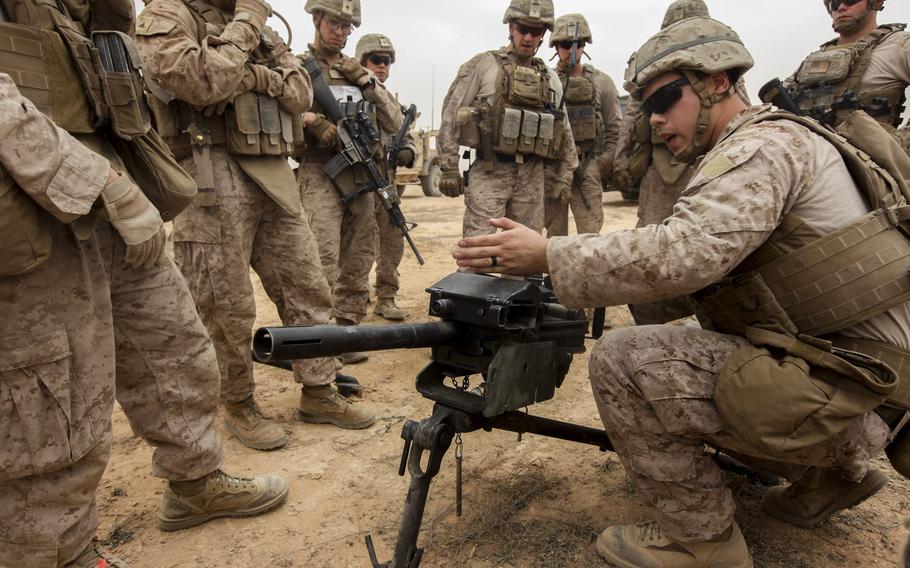
U.S. Marine Pfc. Rieg with Kilo Company, 3rd Battalion, 7th Marine Regiment, attached to Task Force Al Asad, gives a class on the different weapons conditions of the Mk 19 automatic grenade launcher before conducting a live-fire range aboard Al Asad Air Base, Iraq, June 1, 2015. Task Force Al Asad supports Combined Joint Task Force - Operation Inherent Resolve's Building Partner Capacity mission, which aims to increase the military proficiency of Iraqi Security Forces fighting the Islamic State. (Cansin P. Hardyegritag/U.S. Marine Corps)
WASHINGTON — The U.S. will send up to 450 more troops to Iraq to train and assist the beleaguered Iraqi forces in their fight against the Islamic State, the White House announced Wednesday, deepening the U.S. role in efforts to halt the recent momentum of the extremists.
The new trainers will deploy to Taqaddum air base in Anbar province, where they will reach out to local Sunni tribes and provide tactical advice to Iraqi commanders as they prepare for an offensive to recapture the Anbar capital of Ramadi, which was lost last month to the jihadi group in a stunning defeat.
The White House held to its prohibition on using American ground forces in combat, saying none of the U.S. personnel will be accompanying Iraqi forces during fighting.
The decision to increase the 3,000 advisers and trainers currently in Iraq represents the biggest tactical adjustment since the U.S. entered the war 10 months ago. President Barack Obama took the decision after growing public concern that Iraqi security forces are losing the battle with the Islamic State despite unrelenting U.S.-coalition bombing.
“These new advisers will work to build capacity of Iraqi forces, including local tribal fighters, to improve their ability to plan, lead, and conduct operations against ISIL in eastern Anbar under the command of the [Iraqi] prime minister,” the White House wrote in a statement, using another acronym for the militant group.
The new trainers at Taqaddum, known as FOB Ridgeway or “TQ” during the 2003-2011 Iraq war, will focus on building up and training Sunni tribal fighters and preparing Iraqi security forces to retake Ramadi, Fallujah and the rest of Anbar province, the administration said during a conference call.
Pentagon spokesman Col. Steve Warren said the training of Iraqi troops will not center on basic infantry skills but instead will focus on advice and assistance to the leadership of the Iraqi 8th division, which fought in Ramadi and has been operating against the Islamic State elsewhere in the area for months.
U.S. personnel will also work with Sunni tribes to find potential candidates for training in the future, Warren said.
The Iraqi government, dominated by Shiite Muslims, specifically requested help rallying the Sunnis due to U.S. success working with them in Anbar during the previous Iraq war, when they turned against al-Qaida in Iraq, forerunner of the Islamic State, Warren said.
Obama also ordered expedited shipments of weapons to Iraqi government, Sunni and Kurdish peshmerga forces. “This train, advise, and assist mission builds on lessons learned during the past several months and is just one aspect of our commitment to support the Iraqi security forces,” the White House said.
Obama’s war strategy and his aversion to using U.S. ground forces in combat have drawn criticism from Republicans in Congress who have called for sending American troops to the frontlines to advise Iraqi forces and call in airstrikes.
Sen. John McCain, R-Ariz., said the new training deployment is “disconnected from any coherent strategy” in the war against the Islamic State.
“I am also disappointed the additional forces will not deploy closer to the frontlines to call in airstrikes or advise smaller Iraqi units in battle,” McCain said in a statement. “That is the kind of assistance the Iraqis need, but the president has refused to provide.”
He said U.S. operations against the hardline group are keeping a low tempo and have no offensive capacity.
Rep. Mac Thornberry, R-Texas, chairman of the House Armed Services Committee, said the need for more U.S. personnel in Iraq has been apparent for some time and has called for advisors to accompany security forces on the ground.
“As far as it goes, I support this effort,” Thornberry said in a release. “However, disconnected from a broader coherent strategy, it is not likely to be any more successful than our previous efforts.”
The fall of Ramadi last month was a biggest blow to the Iraqi security forces since they fled from Mosul, the country’s second largest city, and much of northern and western Iraq last summer. The Iraqis are locked in a battle for the oil town of Beiji and are gathering outside of Ramadi for what would be the largest counteroffensive of the war.
The U.S. will begin moving the trainers from existing units in Iraq to Taqaddum, about 50 miles west of Baghdad, in the next couple of days and will send more personnel from outside the country later, said Elissa Slotkin, assistant secretary of defense for international security affairs.
“They are not conducting offensive ground combat operations,” she said.
Nearly 9,000 Iraqis have been trained by U.S. personnel at five facilities across Iraq and more than 2,000 are in the pipeline — though Baghdad has not deployed those troops to the key battles in Ramadi and Beiji. The existing six-week program includes basic infantry training such as dealing with the aftermath of improvised explosive devices, collecting intelligence and moving in formation.
The U.S. spent about $25 billion training Iraqis when it occupied the country between 2003-11 but the 14 brigades that remained after Obama ordered a complete pullout quickly folded before an onslaught of Islamic State forces from Syria.
The hardline group has managed to hold large portions of northern and western Iraq after more than 3,000 U.S.-coalition airstrikes.